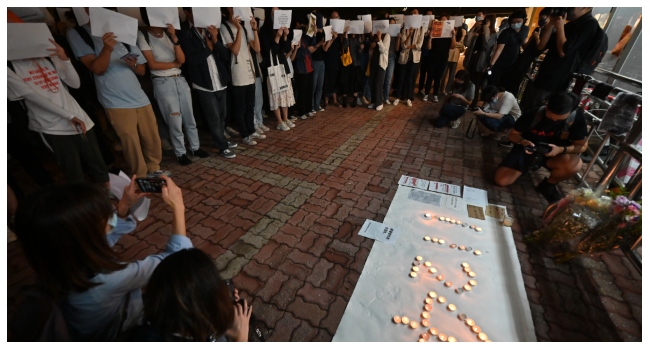Chinese security forces detained people and appeared to prevent a planned protest on Monday as authorities worked to stamp out widening dissent seeking political freedoms and an end to Covid lockdowns.
People have taken to the streets in major cities and gathered at university campuses across China in a wave of protests not seen since pro-democracy rallies in 1989 were crushed.
A deadly fire last week in Urumqi, the capital of northwest China’s Xinjiang region, was the catalyst for the public anger, with many blaming Covid-19 lockdowns for hampering rescue efforts.
Beijing accused “forces with ulterior motives” for linking the fire to Covid measures, saying on Monday local authorities had “made clear the facts and refuted this information and smears”.
At an area in the economic hub of Shanghai where demonstrators gathered at the weekend, AFP witnessed police leading three people away. China’s censors also worked to scrub signs of the social media-driven rallies.
A planned protest in the capital Beijing later on Monday came to nothing as several dozen police officers and vans choked a crossroad near the assembly point in western Haidian district.
Police vehicles lined the road to nearby Sitong Bridge, where a lone protester hung banners last month denouncing President Xi Jinping before being detained.
Demonstrators had planned to march to the bridge following a successful rally the day before near the Liangma river.
In Hong Kong, where mass democracy protests erupted in 2019, dozens gathered at the Chinese University to mourn the victims of the Urumqi fire, an AFP witness said.
People also displayed banners and held flowers in the financial hub’s Central district. Beijing imposed a sweeping national security law on the city after the 2019 protests.
– Chants and banners –
Protesters have notably used the rallies to call for greater freedoms. Some have even demanded the resignation of President Xi, recently re-appointed to a historic third term as China’s leader.
Large crowds gathered Sunday in Beijing and Shanghai, where police clashed with protesters as they tried to stop groups from converging at Wulumuqi street, named after the Mandarin for Urumqi.
Hundreds of people rallied in the same area with blank sheets of paper and flowers to hold what appeared to be a silent protest on Sunday afternoon.
The BBC said one of its journalists had been arrested and beaten by police while covering the Shanghai protests, although China’s foreign ministry said the reporter had not identified himself as such.
A British government minister denounced the Chinese police’s actions as “unacceptable” on Monday.
In Beijing, at least 400 people gathered on the banks of the Liangma for several hours, some shouting: “We are all Xinjiang people! Go Chinese people!”
AFP journalists at the tense scene of the Shanghai protests on Monday saw a heavy police presence, with temporary blue fences in place along the pavements to stop further gatherings.
Three people were then detained by police at the site, an AFP journalist saw, with law enforcement preventing passersby from taking photos or video of the area.
Shanghai police had not responded on Monday to repeated enquiries about how many people had been held. An AFP journalist also filmed people being detained on Sunday.
State censors appeared to have largely cleaned Chinese social media of any news about the rallies by Monday.
The search terms “Liangma River” and “Urumqi Road” had been scrubbed of any references to the rallies on the Twitter-like Weibo platform.
– ‘Boiling point’ –
China’s strict control of information and continued travel curbs tied to the zero-Covid policy make verifying numbers of protesters across the vast country challenging.
But such widespread rallies are exceptionally rare, with authorities harshly clamping down on all opposition to the central government.
Spreading through social media, the protests have been fuelled by frustration at the central government’s virus policy, under which authorities impose snap lockdowns, lengthy quarantines and mass testing campaigns over just a handful of cases.
Protests also occurred on Sunday in Wuhan, the central city where Covid-19 first emerged, while there were reports of demonstrations in Guangzhou and Chengdu.
At the scene of the Beijing riverside rally, where rows of police vehicles were in place on Monday, a jogger in her twenties told AFP she had seen the protests on social media.
“This protest was a good thing, it sent the signal that people were fed up with too strong restrictions,” said the jogger, who asked not to be identified.
State-run newspaper the People’s Daily published a commentary Monday morning warning against “paralysis” and “battle-weariness” in the fight against Covid, but stopped far short of calling for an end to the hardline policy.
“People have now reached a boiling point because there has been no clear path to end the zero-Covid policy,” Alfred Wu Muluan, a Chinese politics expert at the National University of Singapore, told AFP.
“The party has underestimated the people’s anger.”
China reported 40,052 domestic Covid-19 cases Monday, a record high but tiny compared to caseloads in the West at the height of the pandemic.


